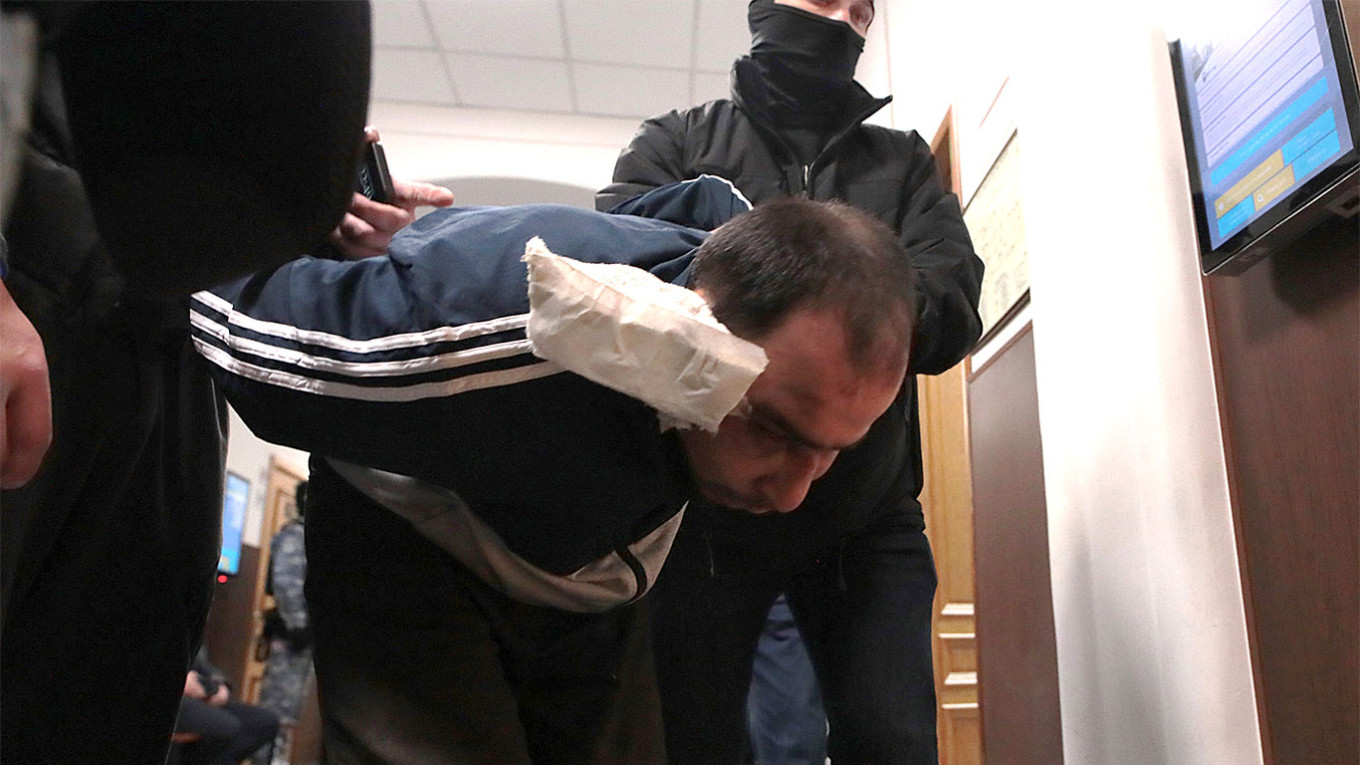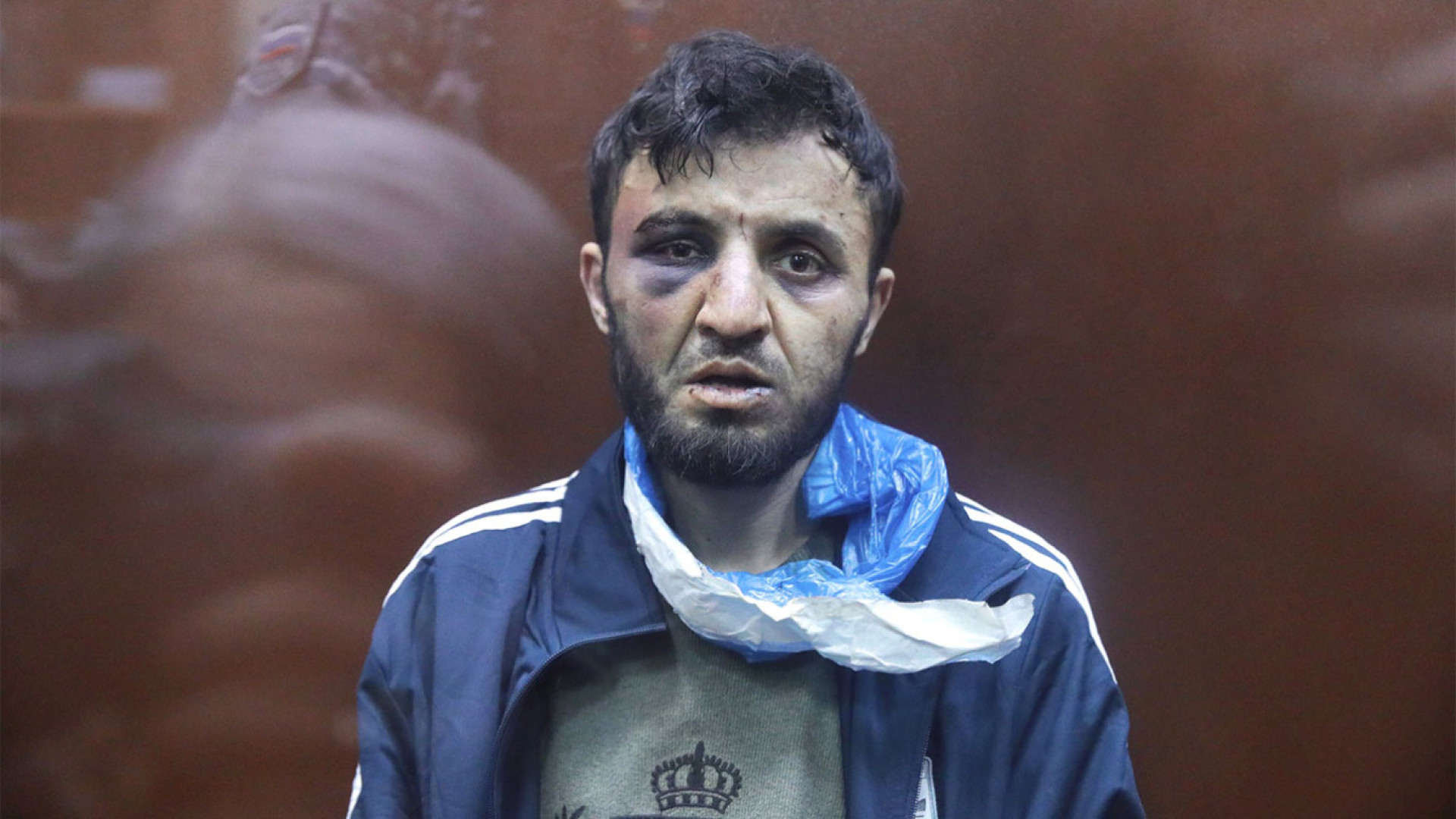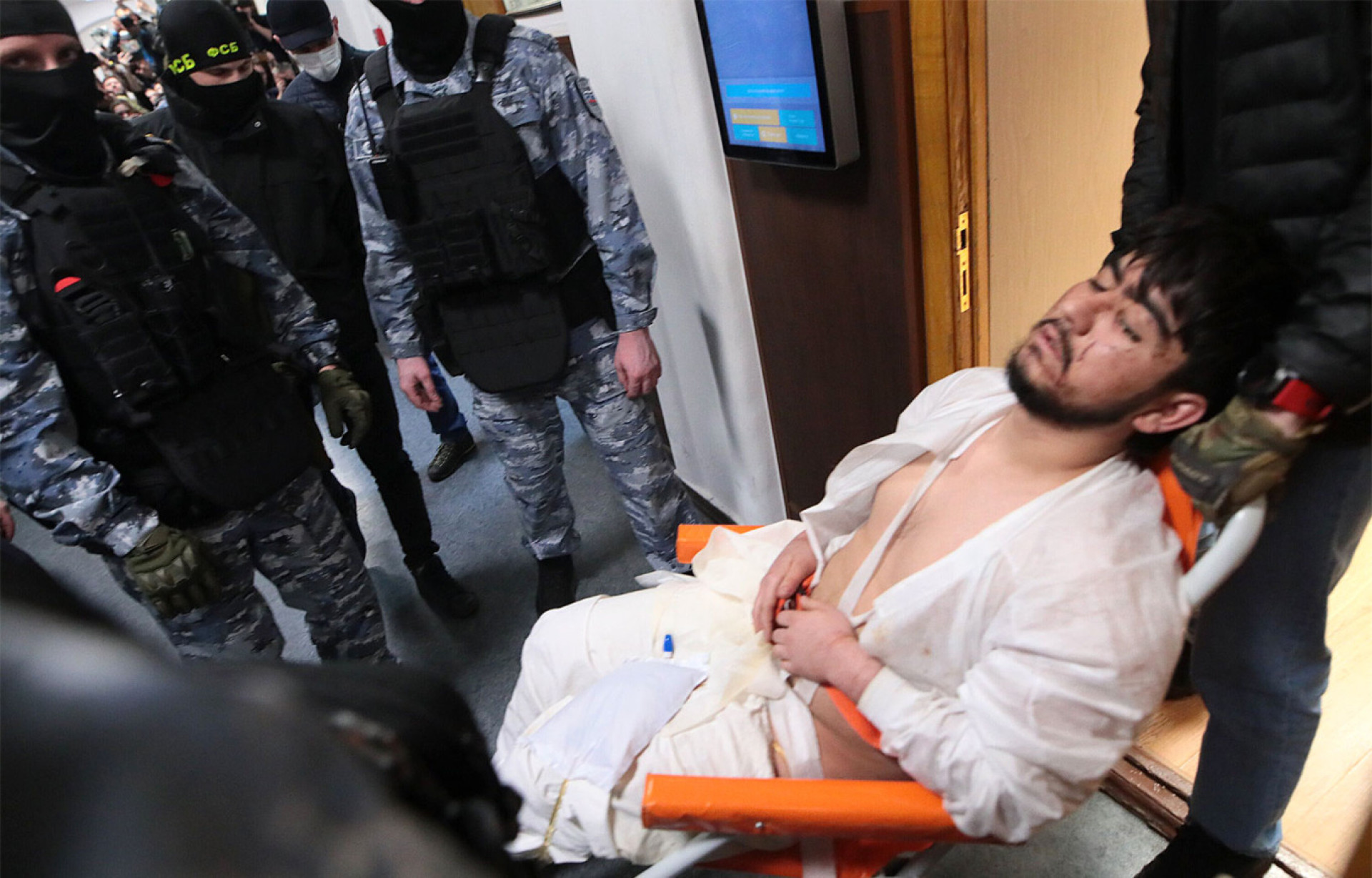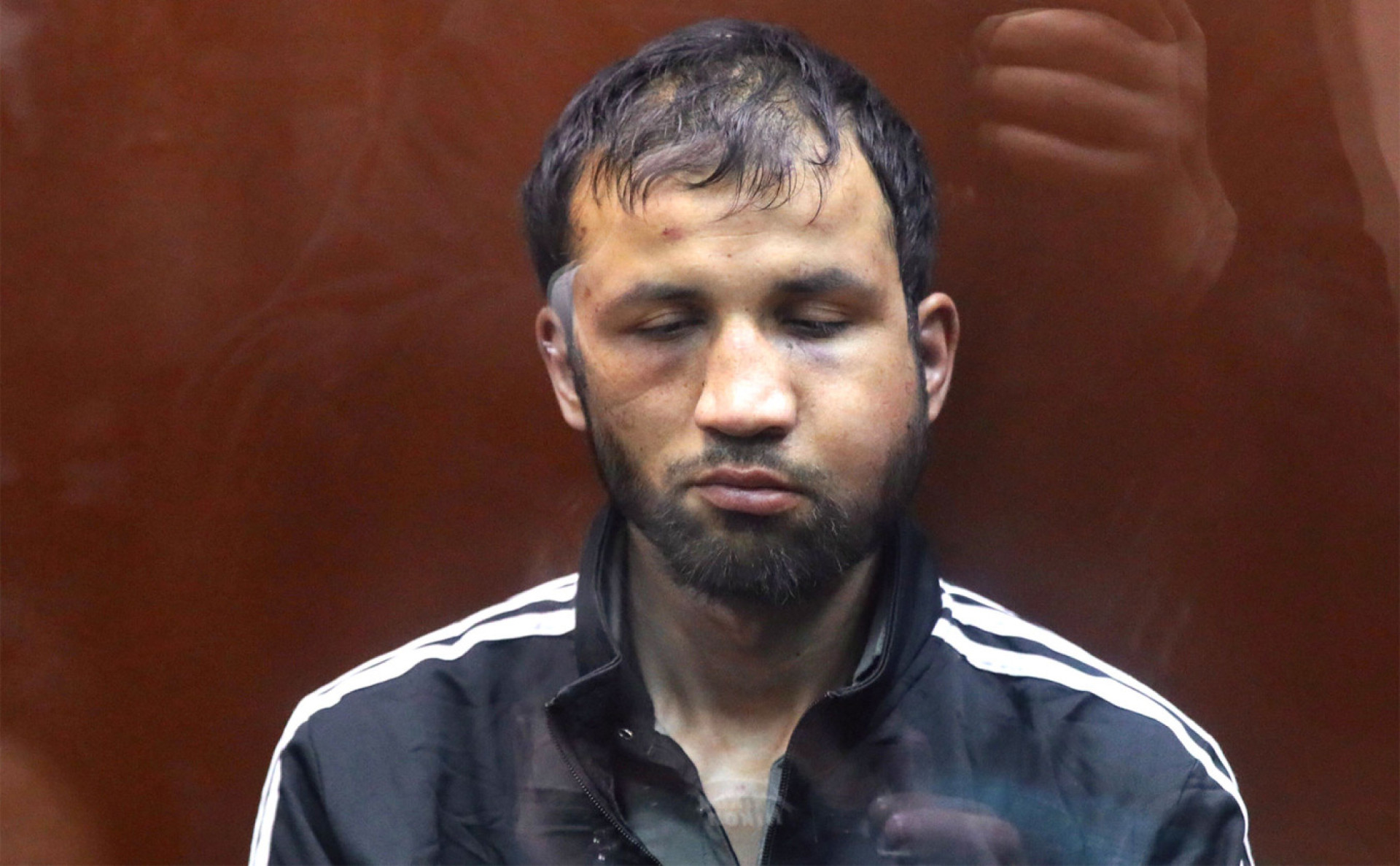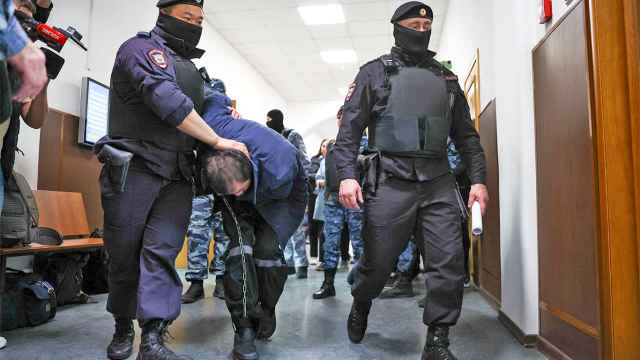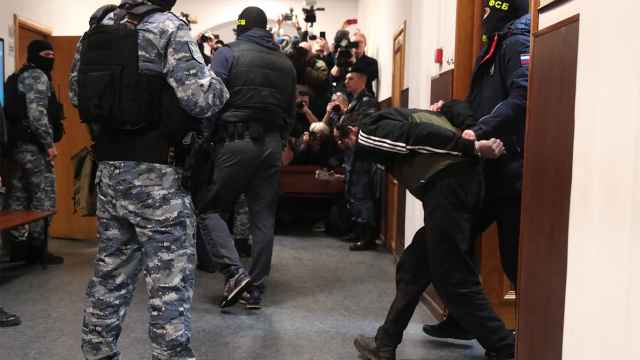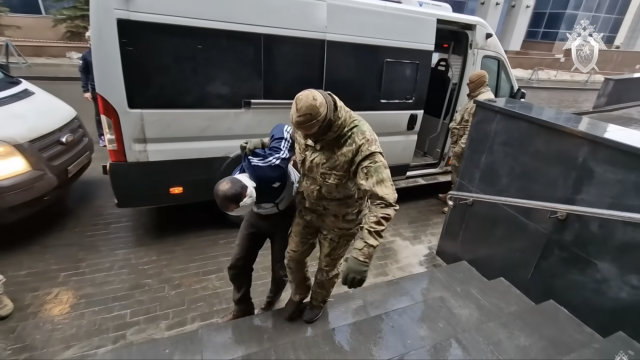Four men accused of killing at least 137 people in the deadly attack on Crocus City Hall appeared in a series of late Sunday court hearings in Moscow with visible bruises, cuts and other injuries.
Unverified graphic footage of the suspects’ interrogations had earlier been published on social media, leading some observers to conclude that the men were tortured by law enforcement.
One of the suspects — Muhammadsobir Fayzov, 19 — was seen being wheeled into Moscow's Basmanny District Court on a gurney, accompanied by a doctor and reportedly unconscious.
Another suspect, Saidakrami Rachabalizoda, 30, was seen in court with a bandage where his ear should be. The previous day, an unverified graphic video showed what appeared to be the same man lying facedown on the ground as law enforcement agents cut off his ear and force it into his mouth.
A man resembling suspect Shamsidin Fariduni, 25, appeared to have been tortured by an electric device in a photo circulated online.
Suspect Dalerjon Mirzoyev, 32, was seen in court with bruises and cuts and a plastic bag around his neck.
Despite the gravity of the accusations against the suspects, rights activists have warned against handling them with violence.
The Moscow Times spoke to lawyer Olga Sadovskaya from The Crew Against Torture, a prominent human rights NGO that monitors cases of torture in Russia and provides support to victims, about what the suspects' treatment means for Russia.
MT: As a human rights activist, what is your response to the video and photos from yesterday of the suspects in the terrorist attack?
OS: This is an obvious case of torture. The use of torture is prohibited by the Russian Criminal Code. In 2022, a separate component of Article 286 of the Criminal Code was even introduced — Part 4 — which is explicitly called “Torture” and explicitly prohibits torture. Everything that was captured in the videos and the photos [with the suspects of the attack] completely fits the description of torture. And, as a matter of fact, this is a crime that we witnessed on live television.
MT: To what extent is showing this kind of footage unprecedented in Russia?
OS: First, any treatment of or behavior [toward detainees] will become normalized and made commonplace if it is distributed widely enough. I think this situation sends two messages. The first is to those who might repeat this crime: “Look how we're going to treat you next time. This is how we treat everyone who commits this kind of crime.” And the second is a message to the general public: “Look how we treat them. The victims have been avenged, and retribution was immediate.”
This is very unusual at the national level, although we have already observed it in Chechnya. For example, in the case of Chechen Salman Tepsurkayev [the moderator of a Telegram channel critical of Chechen officials], who, with his hands tied and completely undressed, was forced to sit on a bottle on camera.
I don’t recall a situation like this at the national level, but today’s situation is a normalization of violence. I think it is also a kind of attempt to respond to public opinion: “Look how good we are, we caught them quickly and we punished them quickly.”
MT: Sociologists note that people in Russia are willing to justify torture and other types of violence in certain cases. Will the public view these images negatively?
OS: The level of tolerance for torture is still very high in Russian society, but in three distinct cases, it is even higher. These are three fairly common types of cases where the majority or a very substantial part of the public tends to believe that it is okay to use unlawful violence against people. These include terrorist attacks, crimes against children — pedophilia, sexual abuse — and cases that concern serial killers. In these instances, the level of tolerance for torture is higher.
Until 2022, the level of tolerance for torture [in Russia] was going down. At the same time, we saw the level of brutality of torture in law enforcement agencies decrease. However, since 2022 [with the start of the war with Ukraine], the level of tolerance for violence — and for any kind of violence, not just torture — is seriously growing. There is more and more violence, and the level of tolerance is getting higher and higher.
MT: What risks does this pose to society?
OS: This blatant demonstration [of torture] signals that it is now permitted and there are no limits to it. There are media reports that police were forced to take over a barbershop where one of the suspected terrorists allegedly worked because the barbershop’s owner is receiving threats and an outraged public is trying to raze it to the ground. This is a perfectly logical, inevitable, straightforward and natural consequence of the normalization of torture in public discourse.
If we can torture them [the suspects of the deadly attack], then we can torture those who were in contact with them, we can torture those who look like them, we can torture anyone we don't like. And this is spreading like an epidemic.
Human rights defenders can continue to work with public opinion and approach it from different angles. We can take a humanistic approach and explain that these are human beings and they should be brought to justice. Studies show how the human body is wired and how neurobiological processes work in this organism. They show that torture is in fact an ineffective means of extracting information.
A person being tortured will only say things that will help to stop the torture. He will not tell the truth. He will say only what the person who is torturing him wants to hear in order to either stop the torture altogether or stop it temporarily.
Therefore, torture does not help in investigating crimes and establishing the truth. Moreover, torture dehumanizes the one who uses it, because the person involves himself in committing a crime, and this in one way or another affects him in the future. That is, torture does not help anyone from any point of view. It only creates an endless wave of violence.
A Message from The Moscow Times:
Dear readers,
We are facing unprecedented challenges. Russia's Prosecutor General's Office has designated The Moscow Times as an "undesirable" organization, criminalizing our work and putting our staff at risk of prosecution. This follows our earlier unjust labeling as a "foreign agent."
These actions are direct attempts to silence independent journalism in Russia. The authorities claim our work "discredits the decisions of the Russian leadership." We see things differently: we strive to provide accurate, unbiased reporting on Russia.
We, the journalists of The Moscow Times, refuse to be silenced. But to continue our work, we need your help.
Your support, no matter how small, makes a world of difference. If you can, please support us monthly starting from just $2. It's quick to set up, and every contribution makes a significant impact.
By supporting The Moscow Times, you're defending open, independent journalism in the face of repression. Thank you for standing with us.
Remind me later.



